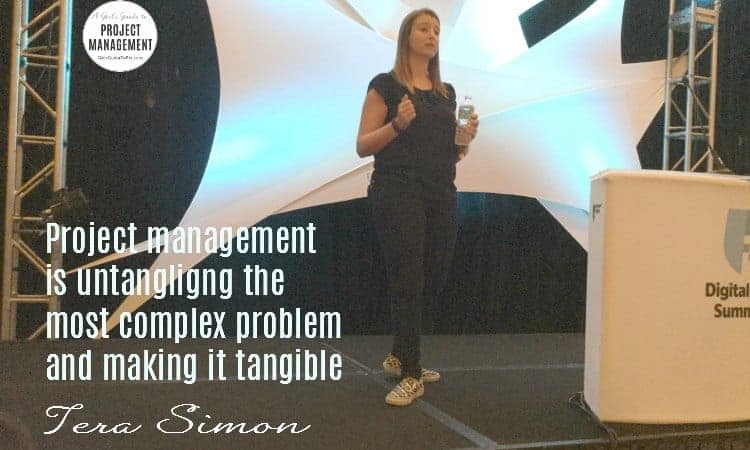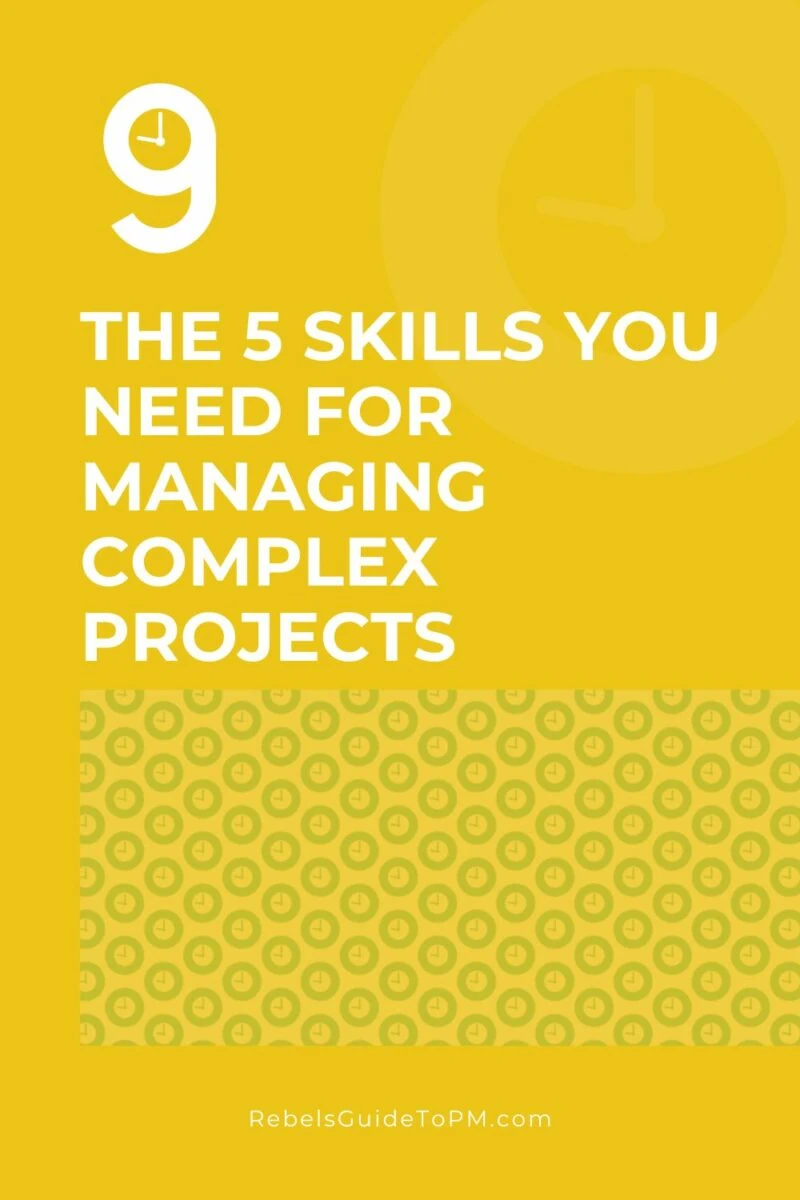The 5 Skills You Need For Managing Complex Projects
Sometimes projects can seem a bit overwhelming. I know – I’ve cried with frustration after a meeting where totally the wrong people put together an unachievable plan.
Complexity adds to the overwhelm. Not only are you feeling that the project is like a cat you can’t get in the carry case to take the vet, but there are a ton of other complicating factors.

Tera Simon spoke about this at the Digital Project Management Summit a few years ago. She shared examples from her experience on complex projects and gave us tips on how to manage the work when it seems unmanageable.
Before I get into that, we need to clarify what we’re talking about. So what makes a project complex?
Difficult Projects and Complex Projects Are Not The Same Thing
Tera talked about the things that make a project complex and it isn’t to do with how difficult it is. These are the 4 things that make projects complex:
1. Involvement of many teams and stakeholders
Complexity comes from having lots of different people involved in the project. This could be on the customer side where they have lots of stakeholders who need to get involved, or because of a mix of suppliers or just because the project touches lots of different teams within the business and they all need to be kept in the loop.
When you manage multiple projects, the stakeholder groups often overlap, and that can be yet another thing making your projects more difficult.
Generally, the larger the number of people involved, the harder things are as you end up managing more office politics and agendas.
2. Numerous moving parts
She explained about how her company had to standardize and bring together 12 disparate government websites. Projects with multiple strands or workstreams are necessarily more complex than when you have one thing to do. There’s just more to juggle and more plates to spin.
You probably know this from your own experience: the more people involved, the more workstreams and the more goals, objectives and deliverables, the harder it is.
For me, the more stakeholders involved, the more complex the project. That goes for internal teams as well as the customer and suppliers. When you add sub-contractors into the mix, that makes things even harder. There are just more channels of communication and a greater likelihood that something will get lost in the process. The risk for the project goes up.
3. The timeline for the project
Short timelines or immovable dates can make a project complex (in conjunction with other factors, I’d say). On Tera’s website project her design agency were not allowed to slip their dates, but another external vendor (procured direct by the client, not a sub-contractor) was running behind on the brand design.
Tera’s team had to start work on the website project without knowing what the final site branding would be. They finally got the approved brand 4-5 months after the development project started.
When they saw the brand files, they realized they weren’t web compliant. The colors and font were not optimized for web and that caused additional complexity for the website project team.
4. Budget and other constraints
Finally there might be other constraints including around the project budget that increase complexity.
This isn’t totally the way I would define complexity on projects. Tera implied but didn’t specifically call out that complexity often happens as a result of a degree of uncertainty, unknowns and interdependencies.
Read Next: Complexity in Mega IT Projects (which is about building a 7-star hospital and defines complexity in a different way) or are you Struggling to implement PM software? (You’re not alone).
However you define it, let’s talk now about the skills you need to manage a complex project.
Complexity Coping Skill #1: Adaptability
You have to realize that things are going to change. This happens on all projects but on complex projects it’s even more the norm than usual.
Being flexible and willing to adapt is a really important skill but something hard to do, especially if you have a plan that you want to follow.
Tera shared a situation where her team had not been flexible and they had lost the client. “You have to pick up on the signs that they are giving you,” she said. Being able to ‘read’ and interpret the small signals from project stakeholders, users and customers is key to not getting caught out.
As a project manager you have immense power to do something about those signals. “You aren’t stuck,” Tera said. “You have the power to make the change, so make the change.”
Complexity Coping Skill #2: Collaboration
You have to be able to listen and work with your team but also your project sponsor or client.
Tera urged us to remember that for the people at the top of the project hierarchy this isn’t their normal job.
“No one ever taught a client how to be a client,” she said. The same goes for lots of in-house project sponsors. While some companies do train sponsors on what their role is, most project sponsors, in-house or otherwise, have no clue about what they are supposed to do on a project and why they are there. Working together is a great way to help shake out those relationships.
Tera also gave a tip about how to make the collaboration work. “Having a process map for a complex project is crucial,” she said. “It helps you visualize what you are doing.”
She recommended mapping out how the project is going to unfold and the key points, especially where you need input from stakeholders. Then you can get it out and show people, using it to help them understand the work.
Collaboration and teamwork are one of top project management competencies you need to be able to excel at the job.
Complexity Coping Skill #3: Communication
Process maps are a good project communication tool, especially if you do what Tera suggested and have a printed out version that you can spread on a conference room table. That face-to-face communication and being hands on is so different from virtual communication tools.
Tera pointed out that today we rely so much on digital means for communications. It’s easy to forget to get up and have a real conversation with people when the Slack app is just there.
Tera’s other tip in this area is to create as much visibility as possible. You don’t want your team to be sitting there not knowing if they are working on the right thing. Be transparent and share, share, share. At some point they might even listen.
Complexity Coping Skill #4: Expertise
You do need some level of expertise before managing a really large project but in reality you don’t always get to have the expertise you need before you tackling a large project.
In that situation I’d advise getting a project management mentor. It’s really valuable to have someone to turn to for all the things that you can’t quite deal with alone. Actually, you probably can deal with them alone because you have to – and project managers tend to thrive on the problem solving aspects of the job. But it’s always nice to have someone to chat to and offload onto and that’s where a mentor can be amazingly helpful.
Complexity Coping Skill #5: Leadership
“Leaders have to be a cheerleader and a bulldozer at the exact same time,” Tera said. You have to be able to look at the whole scope of everything and make it tangible.

She talked about being able to lead a team and also lead a room, which is important for effective project meetings – whether your room is virtual or an actual, physical building where you can all hang out.
She recommended having a document in place detailing the decision-making process for the project and having the sponsor sign up to it. This can help you avoid what Tera called “swoop and poop” which is where an exec comes along and poops all over your project. If they aren’t on the list, then they don’t get to tell you what to do.
I can’t see this working in every situation – some execs will have the power to override what your sponsor signed up to – but it’s certainly a trick I’m going to try!
The skills for managing complex projects also help you on the not-so-complex projects. It’s easy to know what skills you need: you’ve just read about them. It’s harder to develop those skills so that you can take on the complex projects and not be reduced to a quivering wreck. A good starting point is building your business acumen more generally.
This can really help to see the bigger picture and change your outlook, which in turn builds your expertise, develops your leadership skills, helps you communicate more effectively and just be fab at your job.
Your next steps
- Learn more about business acumen on projects
- Get access to the resource library of project management documents, which includes a copy of my free business acumen checklist to help you boost your professional skills at work.
Pin for later reading

